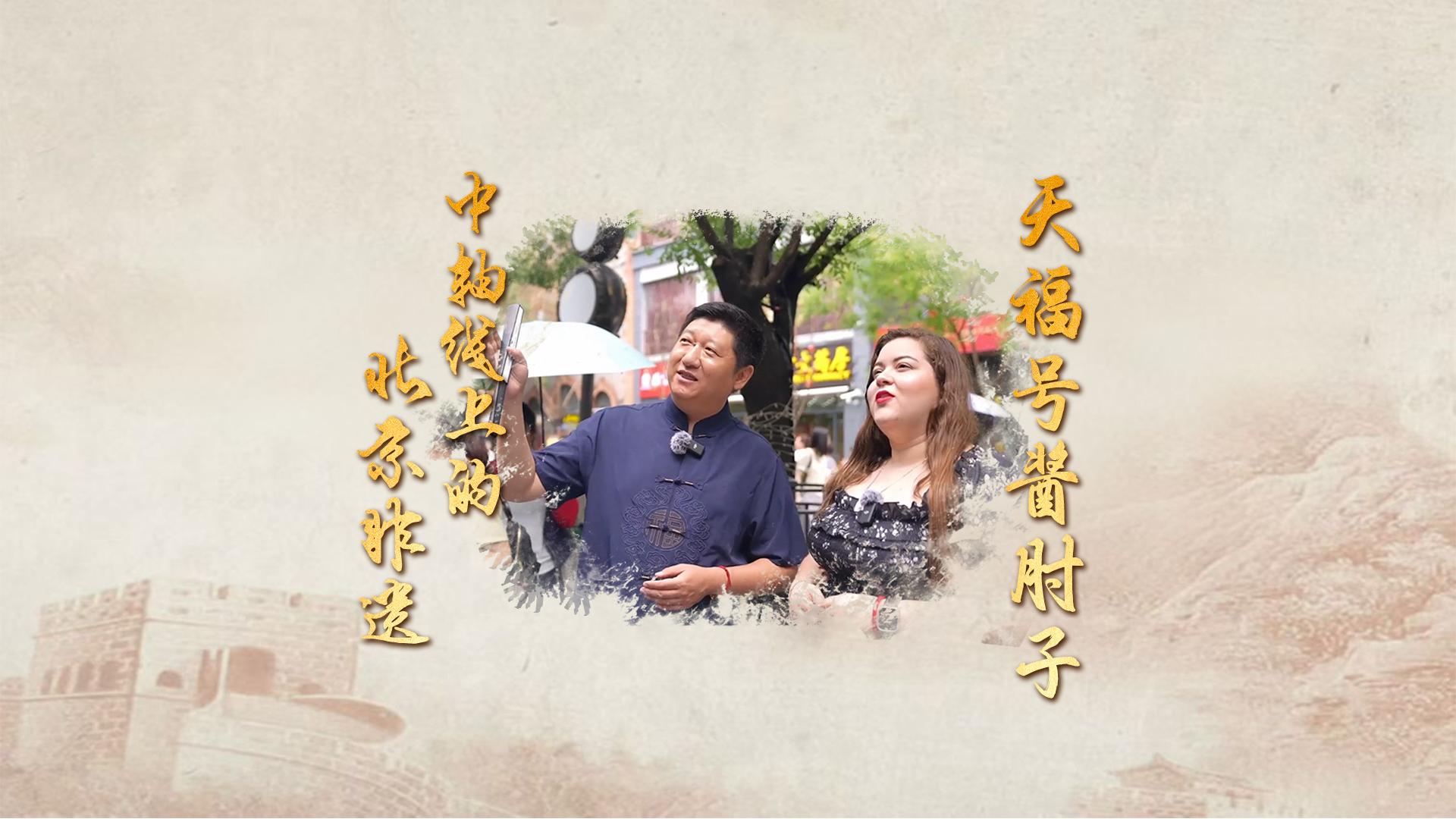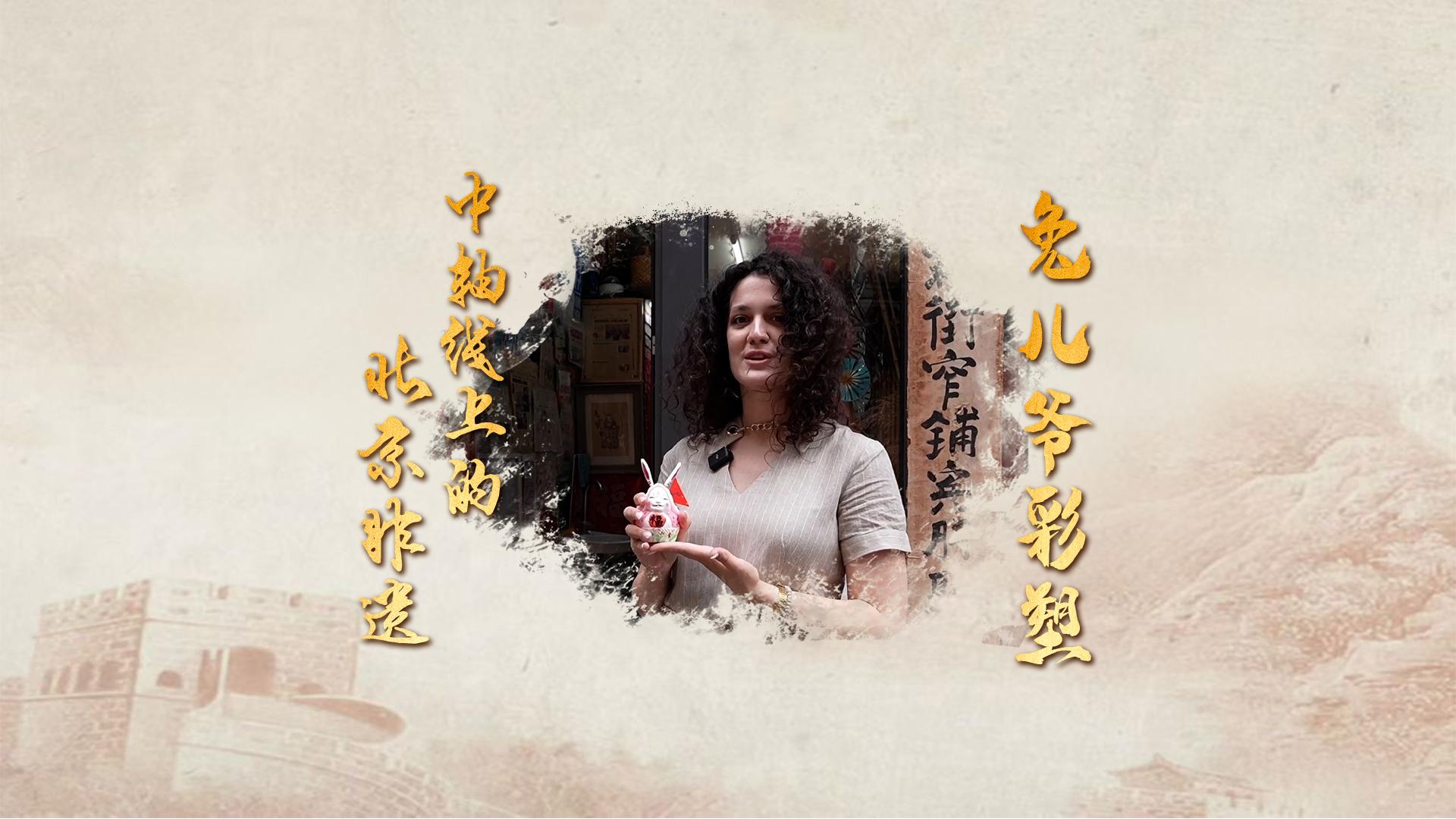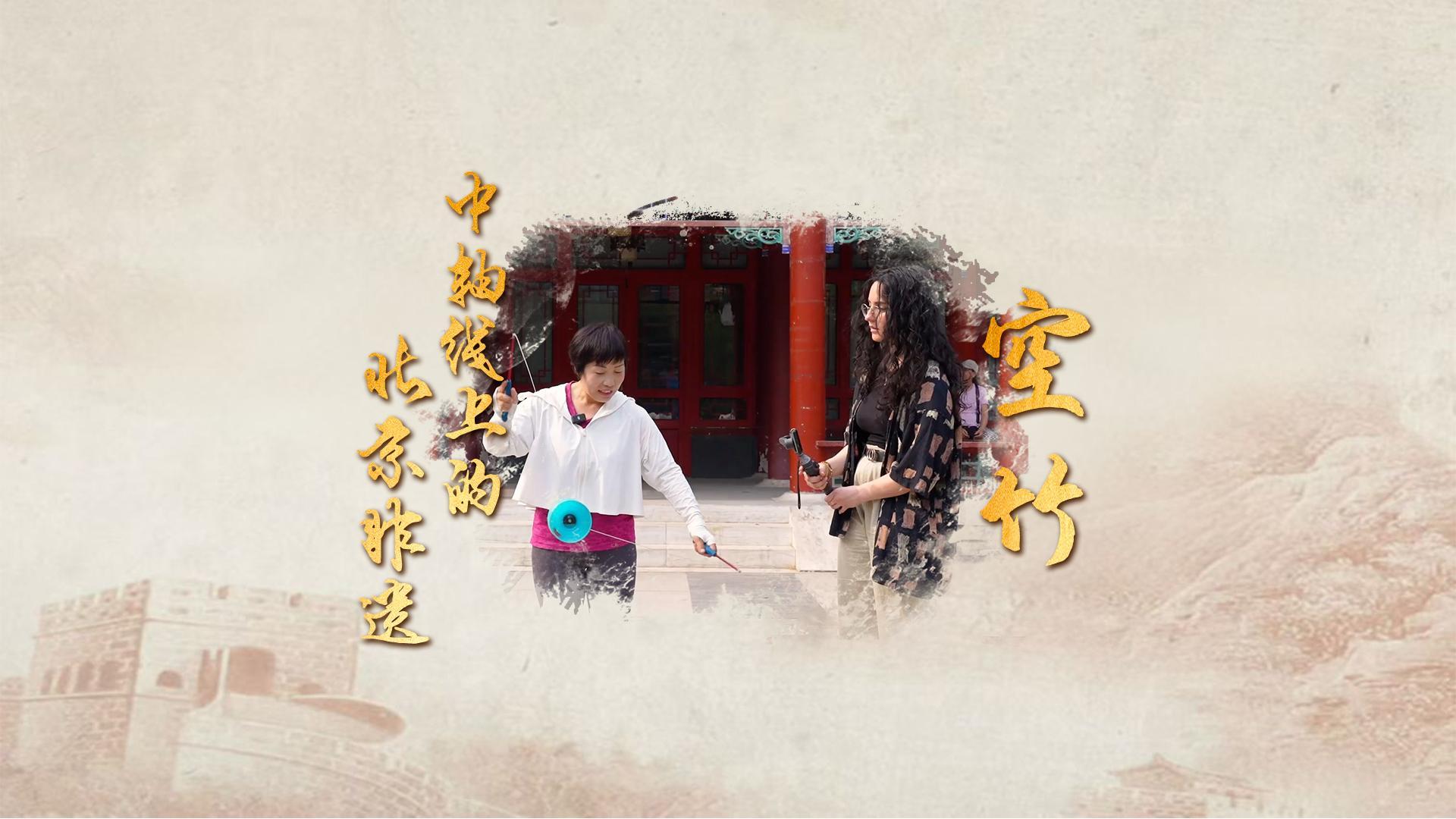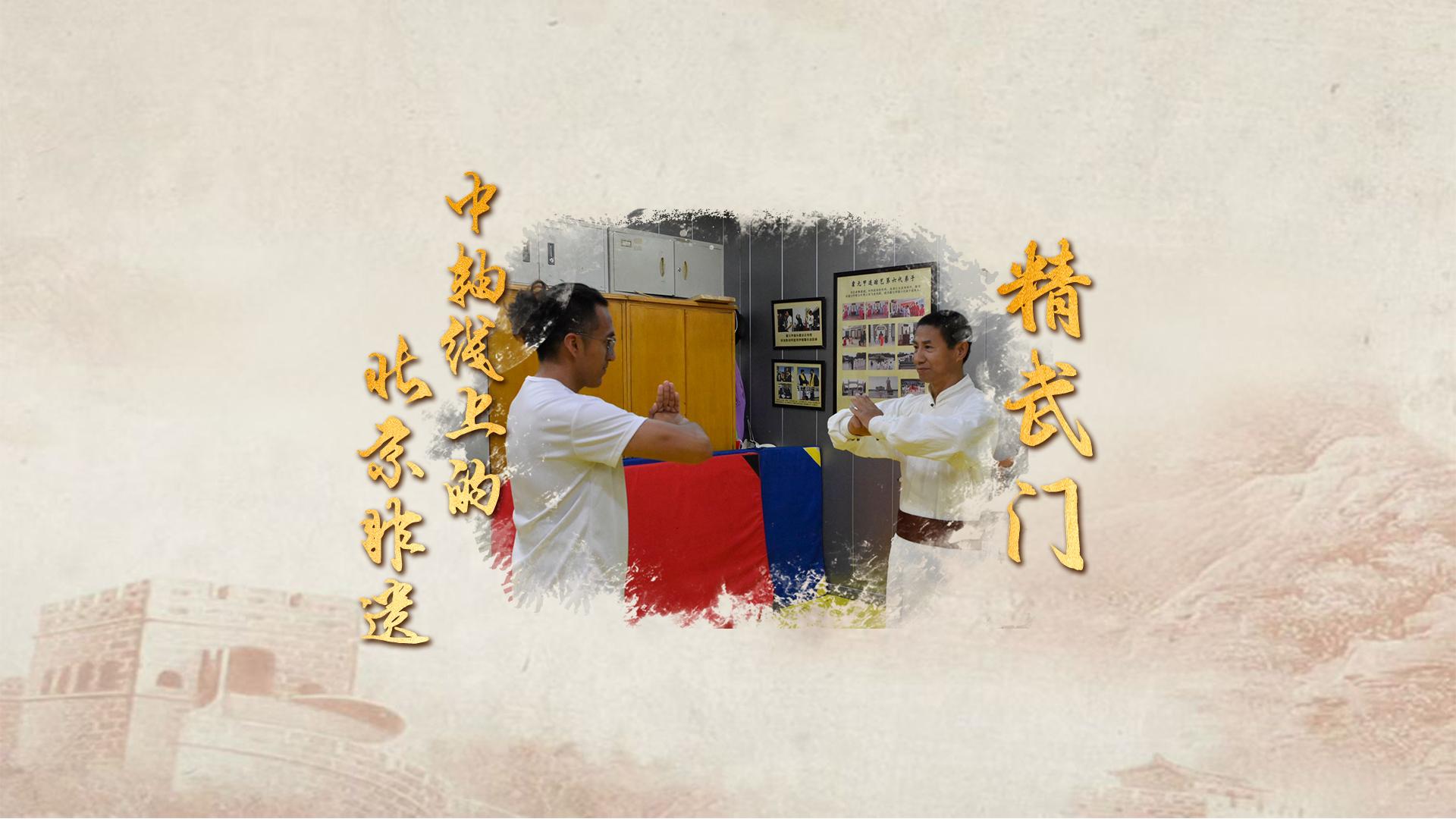北京琴书:来自北京的“土言土语”
撰写:陈一 翻译:孙巍伟
“此一去下山探母,千万要小心。走路要走小路,绕过城镇。怕的是稍有不慎,被官府发现他的人……”站似青竹,声若洪钟,言如珠玉,掷地有声。这段惊羡四座的唱词来自北京琴书代表性传承人王树才老师在天坛南门剧场的琴书表演《李逵下山》。北京琴书是北京地区古曲艺术中具有代表性的曲种,形式是一人站唱,以左手敲击铁片,右手执鼓楗击扁鼓,伴奏乐器为扬琴和四胡。它是“说似唱、唱似说”,唱腔中夹用说白,突出表现北京土言土语,板式有快、慢、散,极大丰富表演和演唱效果。
"When you go down the mountain to visit your mother, be extremely careful. Take the narrow paths, steering clear of the towns. The slightest slip could lead to discovery by government soldiers… " These are the lyrics sung by Wang Shucai, an esteemed inheritor of Beijing Qinshu, as he performs “Likui Descending the Mountain” at the Tiantan Nanmen Theatre in Beijing. Throughout his performance, he stands erect like bamboo, delivering his lines with both elegance and power in a voice resonating like a temple bell. Beijing Qinshu is a quintessential example of local ancient music, performed solo by a standing artist, who uses his/her left hand to strike iron clappers while holding a drumstick in the right hand to beat a flat drum. Accompanying the performance are the yangqin (a type of Chinese dulcimer) and sihu (a four-stringed instrument). Such performance accentuates the Beijing vernacular, skillfully intertwining speaking with singing, where spoken elements effortlessly merge with melodic lyrics, embodying the unique style of “speaking as if singing, singing as if speaking”. And its tempos vary between fast, slow, and free-flowing, greatly enhancing the performance and vocal dynamics.
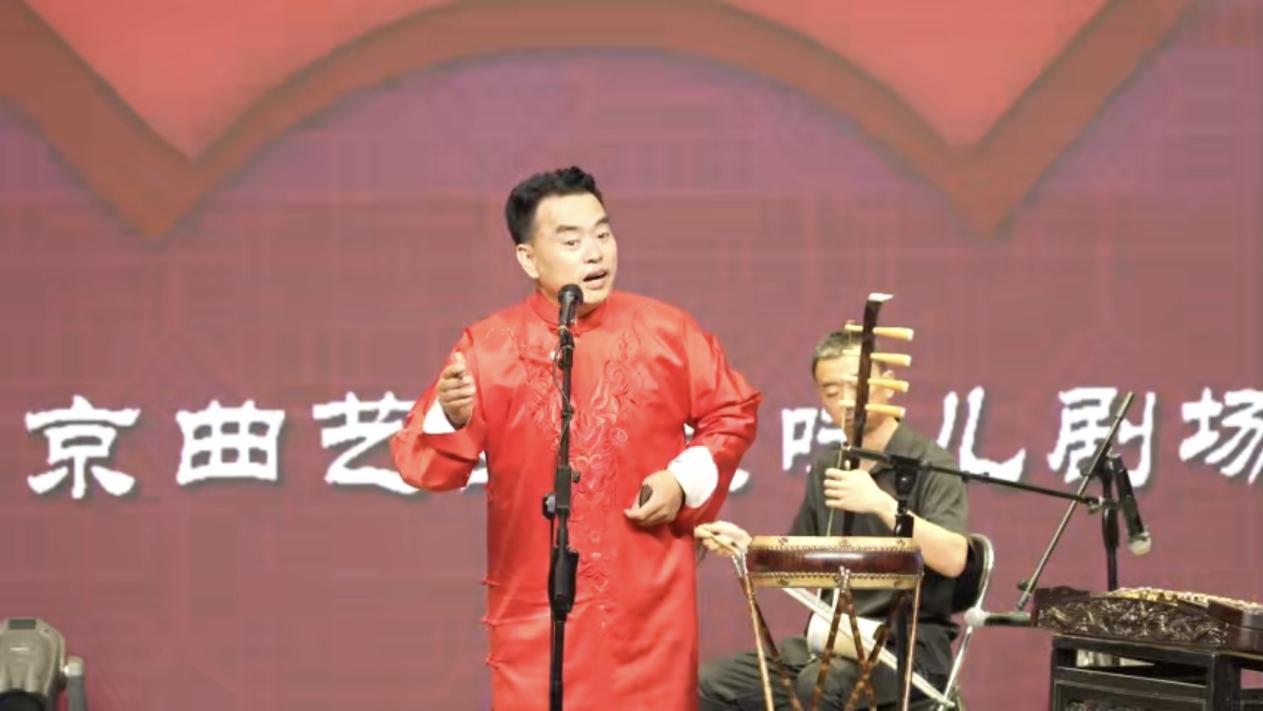
王树才表演北京琴书《李逵下山》
Wang Shucai is performing the Beijing Qinshu piece "Li Kui Descending the Mountain"
王树才是唯一一名以北京琴书为业的专业古曲演员,近年来,他除了演绎师父关学曾的经典唱段,也创作出一大批反映时代变迁,讲述古都风貌的优秀作品,如反映京城胡同变迁的《东四胡同》、反映古代京城水系连通故事的《郭守敬》等。据王树才介绍,北京琴书源自大兴采育和通州马驹桥一带,是最古老的舞曲形式之一,最初名为单琴大鼓或五音大鼓,后由他的师父关学曾先生更作“北京琴书”。“1951年秋天全国文艺调研报幕的时候,有的叫‘西河’大鼓,有的叫‘京韵’大鼓,到关学曾先生这一报——琴书,大家都不知道是哪儿的。”王树才讲述到。“后来我们先生便和他的琴师吴长宝先生商量:琴书说的是北京的事儿,唱的是北京的曲儿,吐的是北京的字儿,就定名为‘北京’琴书。”
Wang Shucai is the only professional artist who has dedicated his career to Beijing Qinshu. In recent years, he has not only carried on the legacy of his mentor, Guan Xuezeng, by continuing to perform his teacher’s classic pieces, but also created a large number of outstanding original works that reflect the changes of the times and depict the the features of the ancient capital. Examples include "Dongsi Hutong", which showcases the transformations of the old alleys in Beijing, and "Guo Shoujing", which narrates the stories of the interconnected waterways in ancient Beijing. According to Wang Shucai, Beijing Qinshu originated in the area of Caiyu in Daxing District and Ma Juqiao in Tongzhou District, making it one of the oldest dance music forms. Initially known as "Danqin Daguo" or "Wuyin Daguo", it was later renamed "Beijing Qinshu" by his mentor, Mr. Guan Xuezeng. "During the national art and culture showcase in the autumn of 1951, programs like ‘Xihe Dagu’ and “Jingyun Dagu’ were announced with clear origins. But when Mr. Guan Xuezeng said 'Qinshu', no one could tell where it originated," recounted Wang Shucai. "Later, my mentor discussed with Mr. Wu Changbao, the yangqin performer on his team, and they decided that it should be named 'Beijing' Qinshu, since it talks about what happens in Beijing, sings in Beijing tunes, and speaks in Beijing’s dialect, "
近年来,王树才致力于通过以新媒体为例的多种渠道,推动北京琴书走出京都甚至打破国门,让外国友人也能欣赏这音律优美的东方古韵,领略非遗文化的魅力。王树才曾指导过来自摩洛哥及新加坡等多地的外国学生,也和他们一起参加过《星光大道》等综艺节目。“只要你会说中国话,就能学北京琴书。”王树才说。“如果有同学来找到我,想要学习琴书,我一定会认真地教,积极传授咱们这门民族艺术。”
In recent years, Wang Shucai has devoted himself to promoting Beijing Qinshu through various avenues, including new media as a key channel, striving for it to transcend the boundaries of Beijing and even cross national borders, enabling foreign friends to appreciate the melodious ancient charm of the East and experience the allure of intangible cultural heritage. Wang Shucai has mentored students from diverse locations such as Morocco and Singapore, and together they have participated in variety shows like "Star Avenue". "As long as you can speak Chinese, you can learn Beijing Qinshu," says Wang Shucai. "If any students come to me with a desire to learn Qinshu, I will teach them earnestly and actively pass on this national art form."
而在开头提到的《李逵下山》表演的观众中,就有一位来自越南的朋友黄盛丰。他被这段精彩绝伦的琴书演绎所吸引,演出结束之后来到后台与王树才老师交流,对方也盛情欢迎,倾囊相授一些琴书的基础技法。
During the "Li Kui Descending the Mountain" performance mentioned earlier, among the spectators was Huang Shengfeng, a young man from Vietnam. Captivated by Wang Shucai’s enchanting display of Qinshu, he ventured backstage to meet Mr. Wang after the curtain fell. Teacher Wang warmly welcomed him and shared some foundational skills of Qinshu performance with him.
“琴书听着简单,其实要掌握那个韵味也不容易。”王树才回忆道。“我当年和我们的老师琴书泰斗关学曾先生学习的时候,光是一句就学了六个月。”在老师的悉心带领下,黄盛丰开始尝试着发音找调,在摸索和实践中逐渐加深了对琴书的了解。“谁都爱听,长命百岁,这句吉祥话,啊呀——”这是三十多岁初学琴书的王树才曾花费半年才得以流利掌握的唱段,如今从黄盛丰的口中以青涩的发音和稚嫩的形式吐出,像是时空上的重合与衔接,像是一条贯穿古今、连接中外的奔流不息的澎湃江河。
"Qinshu may sound simple, but getting the hang of its essence is far from easy," reminisced Wang Shucai. "When I was studying under the guidance of Mr. Guan Xuezeng, the Qinshu master, it took me six months to learn just one sentence." Under the meticulous coaching of Wang Shucai, Huang Shengfeng began experimenting with pronunciation and melody, gradually deepening his understanding of Qinshu. "Everyone enjoys hearing the blessing: May you live a long and prosperous life, ah—" This is a verse from Qinshu that Teacher Wang, who started learning in his thirties, spent half a year perfecting until he could sing it fluently. Now, it emerged from Huang's lips, though with a touch of inexperience in pronunciation and a hint of rawness in style, reflecting the journey of mastery that bridges time and space, like a continuous river flowing from ancient to modern, connecting East and West.
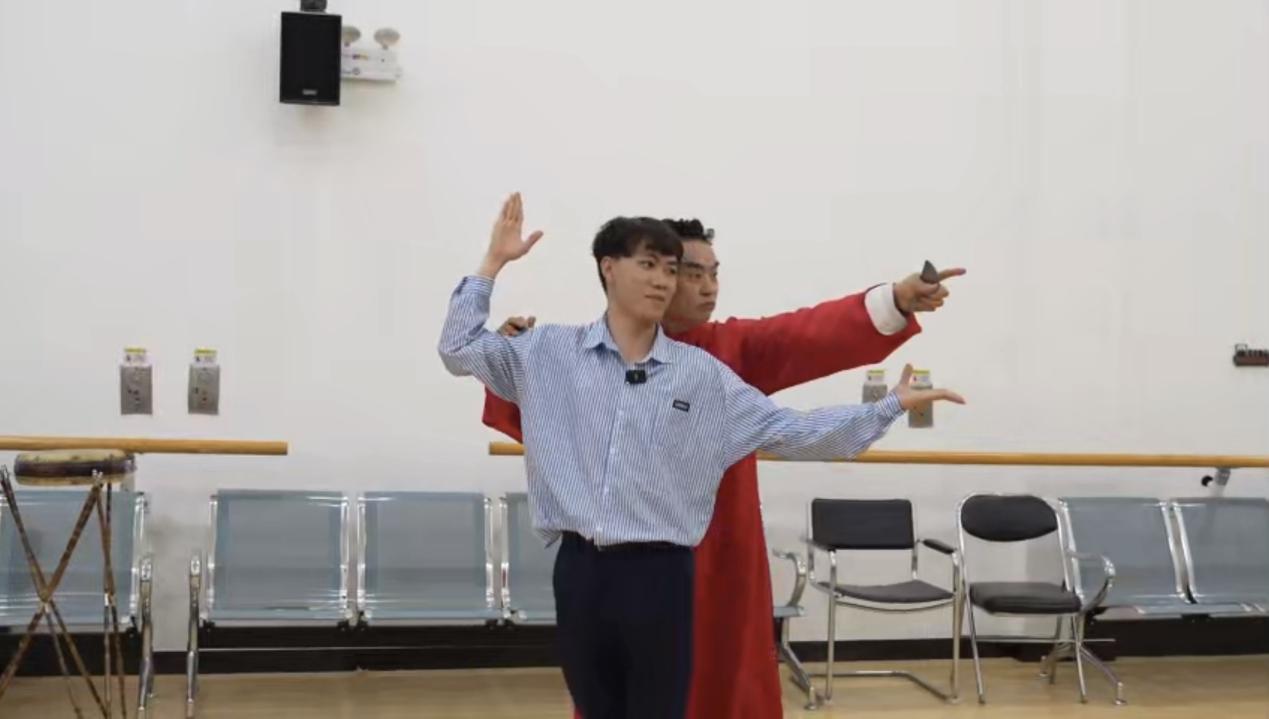
王树才教授黄盛丰演绎北京琴书
Wang Shucai is mentoring Huang Shengfeng in the performance of Beijing Qinshu
现在,北京曲艺团和北京小学万年花城分校联合举办了曲艺班,教授包括北京琴书、京东大鼓、单弦等非遗文化在内的一系列课程。王树才说,过去有句俗语叫做“活保人,人保活”,倘若没有艺术家来呈现,再好的作品也会是一杯白开水。而非遗传承人所做的正是将这白水烧烫煮沸,添以茶叶,焕其甘香。“当初我们先生收我做学徒,义务免费传授,一分钱也不收,甚至还管炸酱面。有时候坐车回家兜里没钱了,先生还给你100块钱让你打车。”王树才讲述到。
Now, Beijing Opera Traditional Folk Arts Troupe and Wan Nian Huacheng Branch, Beijing Primary School have jointly established a traditional folk arts training class, offering a range of courses encompassing various intangible cultural heritage programs, including Beijing Qinshu, Jingdong Dagu, and Danxian. Wang Shucai recalled an old saying, "The art sustains the artist, and the artist sustains the art.” Without artists to breathe life into it, even the most exquisite work would be as bland as plain water. It falls to the inheritors of intangible cultural heritage to transform this water into boiling tea, enhancing its fragrance with tea leaves. "When my mentor took me on as his apprentice, he taught me gratis, without charging a single penny, and even provided me with fried sauce noodles. Sometimes when I didn't have enough money for the bus fare home, he would generously give me 100 yuan for a taxi ride," recounted Wang Shucai.
正如王树才所说,非遗传承如同择水煮茶、旷原植木,是一个不断承接与开辟的过程。从古至今一位又一位的非遗传承人就好似无私燃烧的蜡炬,以一己之火光,亮天下之苍穹。从黄盛丰口中一句脆生生的“长命百岁吉祥话”开始,未来还会有更多这样动人的故事出现,将中国非物质文化遗产的洪亮的声音传递下去。
As Mr. Wang elaborated, inheriting intangible cultural heritage is like choosing water for tea or planting trees in open spaces—a constant cycle of absorbing and innovating. Throughout the ages, these dedicated inheritors have been like selfless candles, lighting up the world with their own flame. Starting with the crisp "May you live a long and prosperous life" from Huang Shengfeng, there will continue to be more such touching tales, resonating with the powerful voice of China's intangible cultural heritage and carrying it forward into the future.

